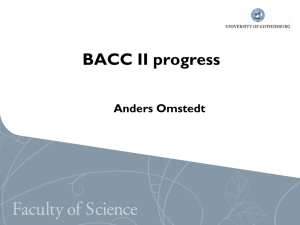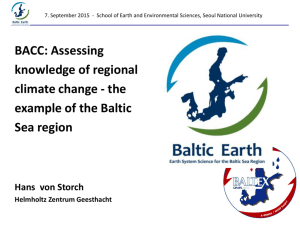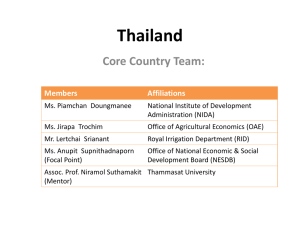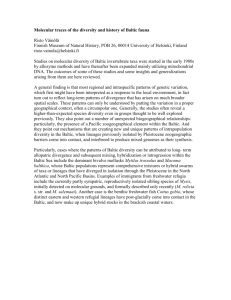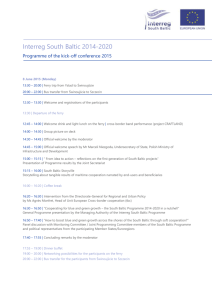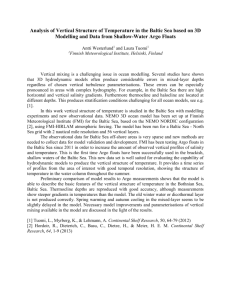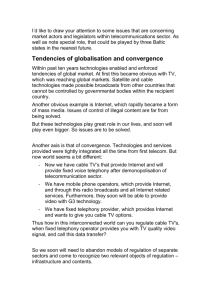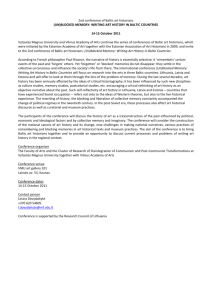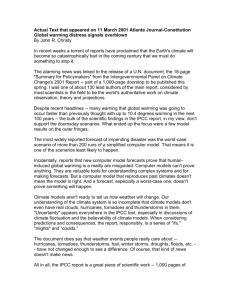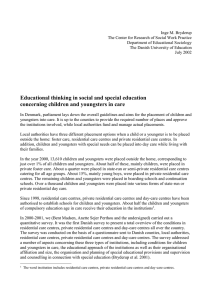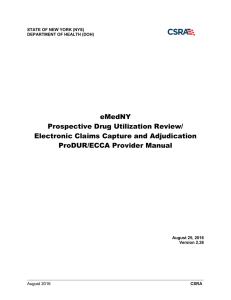Climate is changing
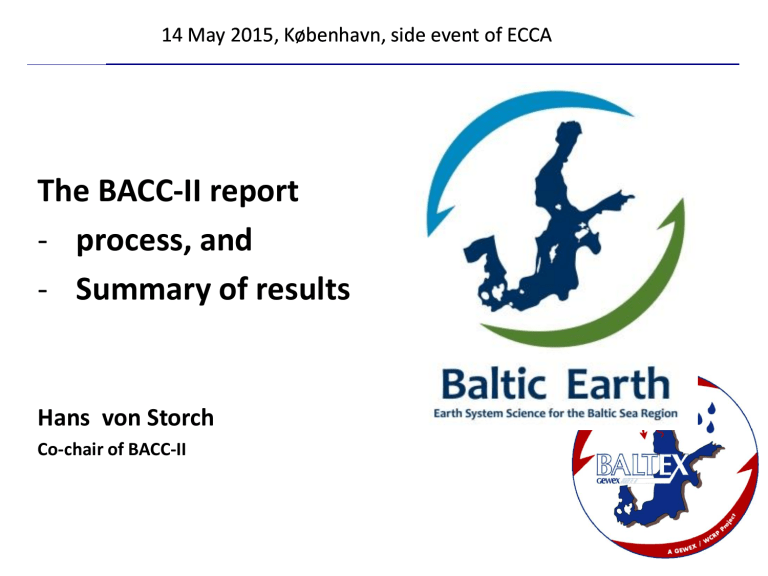
The BACC-II report
- process, and
- Summary of results
Hans von Storch
Co-chair of BACC-II
IPCC: Global temperature development
14 May 2015, København, side event of ECCA during “instrumental times”
IPCC presents and assesses the knowledge about climate change and climate impact on the global and all large regions (such as Europe).
BACC is a little cousin of IPCC doing something similar but only for the Baltic Sea region.
The two concepts are broadly similar, but deviate in soem significant ways, in particular the non-involvement of governments by BACC.
3
B ALTEX A ssessment of C limate C hange for the
Baltic Sea basin BACC
An effort to establish which scientifically legitimized knowledge about climate change and its impacts is available for the Baltic Sea catchment.
Approximately 80 scientists from 12 countries have documented and assessed the published knowledge in 2008 in BACC 1;
Now, in May 2015, BACC-2 comes out, with about 130 contributing authors.
The assessment has been accepted by the intergovernmental HELCOM commission as a basis for its judgment and recommendations.
14 May 2015, København, side event of ECCA
Principles
→ The assessment is a synthesis of material drawn comprehensively from the available scientifically legitimate literature (e.g. peer reviewed literature, conference proceedings, reports of scientific institutes).
→ Influence or funding from groups with a political, economical or ideological agenda is not allowed; however, questions from such groups are welcome.
→ If a consensus view cannot be found in the above defined literature, this is clearly stated and the differing views are documented. The assessment thus encompasses the knowledge about what scientists agree on but also identify cases of disagreement or knowledge gaps.
→ The assessment is evaluated by independent scientific reviewers.
Printed at
→ Presently a warming is going on in the Baltic
Sea region, and will continue throughout the 21 st century.
→ BACC considers it plausible that this warming is at least partly related to anthropogenic factors.
→ So far, and in the next few decades, the signal is limited to temperature and directly related variables, such as ice conditions.
→ Later, changes in the water cycle are expected to become obvious.
→ This regional warming will have a variety of effects on terrestrial and marine ecosystems
– some predictable such as the changes in the phenology others so far hardly predictable.
Printed at
• New assessment finds results of BACC I valid
• Significant detail and additional material has been found and assessed.
Some contested issues have been reconciled (e.g. sea surface temperature trends)
• Ability to run multi-model ensembles seems a major addition; first signs of detection studies, but attribution still weak
• Regional climate models still suffer from partly severe biases; the effect of certain drivers (aerosols, land use change) on regional climate statistics cannot be described by these models.
• Data homogeneity is still a problem and sometimes not taken seriously enough
• The issue of multiple drivers on ecosystems and socio-economy is recognized, but more efforts to deal with are needed
• In many cases, the relative importance of different drivers, not only climate change, needs to be evaluated.
Printed at
• Estimates of future deposition and fluxes of substances like sulphur , nitrogen oxides, and carbondioxide depend on future emissions. Atmospheric factors are less important than emission changes.
• In the narrow coastal zone plant and animal communities have to adapt to changing climate and to land uplift.
• Climate change is a compounding factor for freshwater biogeochemistry. The effect of climate change cannot be quantified yet on a Baltic Basin wide-scale.
• Scenario simulations suggest that most probably the Baltic Sea will become more acid in the future.
• Increased oxygen deficiency, increased temperature, changed salinity and increased acidification will impact the marine ecosystem in several ways and may erode the resilience of the ecosystem.
• Increasing need for adaptive management strategies (forestry, agriculture, urban complexes) in the Baltic Sea Basin that deal with both climate change but also emissions of nutrients, aerosols, carbondioxide and other substances.
Printed at
14 May 2015, København, side event of ECCA
Detection and Attribution
→ Detection of non-natural influence on regional warming. Can be explained only if increased greenhouse gas concentrations contribute. Present trend consistent with model scenarios.
→ Detection of non-natural component in trends of precipitation amounts; present trends much larger than what is anticipated by models; thus no consistent explanation for the time being.
→ Lack of studies on detection of changes in other variables
(e.g. snow cover, runoff, sea ice)
→ Lack of studies of the effect of other drivers (reduction of industrial aerosols, land use change)
Printed at
knowledge for societies to decide about limiting climate change
Yes,
- Climate is changing,
- We can not explain this change in terms of temperature without referring to elevated greenhouse gases
- When looking at change in general, global climate change is one factor; others may be at work as well, sometimes dominantly so.
- Climate change represents a challenge for human societies and ecosystems
- Climate change can be limited by limiting the accumulation of greenhouse gases in the atmosphere.
Whether societies agree on joining to actually limit climate change is legitimately a matter of policymaking, of values, of societal choices.
adaptation remains – this is a regional and local issue
We have not done our homework
- studying ongoing and possible future change.
- separating the different causes for observed change.
Climate science needs to deal more with options of adaptation to prepare for societal decisions.
The more successful the climate change limitation policy is, the less adaptation is needed – but adaptation is needed, and is useful in any case, because of reduced vulnerability.
The regional scientific community is asked to generate the needed knowledge. The eventual decisions needed are again a matter of policymaking, of values, of societal choices.
